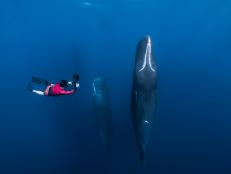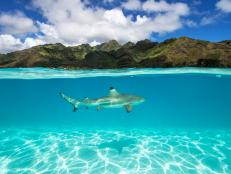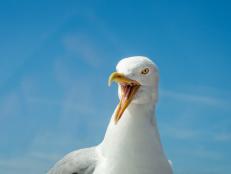All Space Articles
Showing 466 - 480 of 491 results
Curiosity Daily Podcast: Cooked vs. Uncooked Fruits and Veggies (w/ The Nutrition Wonk), Food Poisoning Facts, and Milky Way’s Second Life
Learn where food poisoning comes from (and how to avoid it); why we’re in the Milky Way’s second life.; and whether fruits and vegetables are healthier when they’re fresh or frozen.
Curiosity Daily Podcast: Meteorite Hunting with The Aquarius Project, Roommate Drama In Space, and Language Based On Senses
Learn why scientists are worried about roommate drama in space and why your most important sense depends on the language you speak. Plus, Adler Planetarium’s Aubrey Henretty and Chris Bresky discuss The Aquarius Project, a teen-driven underwater ROV meteorite hunt led by experts from the Adler Planetarium, the Shedd Aquarium, The Field Museum, and NASA.
Curiosity Daily Podcast: What Makes People Cultural Omnivores, Archaeologists’ Prehistoric Poop Problem, and How to Tell Stars and Planets Apart in the Sky
Learn about how archaeologists are solving a prehistoric poop problem; what leads people to be “cultural omnivores”; and an easy trick for telling stars and planets apart when you’re stargazing.
Celebrate Earth Month with New Specials and Series on discovery+
Brand new documentaries and series on discovery+ include ENDANGERED, produced and narrated by Ellen DeGeneres, which follows the effort of dedicated wildlife conservationists across the globe as they work to compile the latest version of The Red List.
Curiosity Daily Podcast: Solar Salads, Cursed Caffeine, Webb’s First Photo
Today, you’ll learn about the benefits of shading rooftop gardens with solar panels, caffeine’s dark secrets, and how the first image from the James Webb telescope promises a great run for Hubble’s successor.
Curiosity Daily Podcast: Signals Dogs Use to Talk to You, NASA’s Lost Moon Photos, and the Sugar Rush Is a Myth
Learn about why there’s no such thing as a sugar rush; why it took more than 40 years to see NASA’s high-resolution images of the Moon; and, how dogs use referential signals to communicate with humans.
Curiosity Daily Podcast: Using Lava Lamps to Generate Randomness (w/ Matt Parker), How Ritalin Makes You Focus, and What Bacteria Beneath the Sea Floor Means for Life on Mars
Learn about how drugs like Ritalin and Adderall actually make you “focus,” how tech companies are using lava lamps to make computers more secure, and why new life discovered at the bottom of the ocean opens up new possibilities for finding life on Mars.
Curiosity Daily Podcast: The Sinister Darkness Factor Trait, Why Pluto’s Definition Matters, and World Record Pumpkins
Learn about a personality trait called the D Factor that might be behind all the evil in the world; why the Pluto planet debate just won’t go away; and how much time it takes to grow giant, prize-worthy pumpkins.
Curiosity Daily Podcast: Your Biggest Regret, Tall Mountain Myths, The Deep Web
Learn about why your biggest regret is the thing you didn’t do; the tallest mountains on Earth; and the Deep Web.
NASA is Helping Save Sharks
As the battle to save species across the world wages on, conservation efforts are becoming more and more technological in tracking, monitoring and collecting data.And perhaps one of the most advanced techniques is currently being deployed by NASA, an unlikely ally in the fight to save sharks.
How to Save Humanity from Extinction
Here are some goals we need to achieve if we want to reach our 500,000th birthday as a species.
Curiosity Daily Podcast: Seeing Stars, Seagull Staredown, Itsy Bitsy Microdrones
Today, you’ll learn about how cultures across the world often make constellations from the same groups of stars due to the nature of vision and perception, what to do when an animal tries to steal your food during a picnic on the beach, and drones smaller than a red blood cell that can be controlled using only the power of light.
Curiosity Daily Podcast: Fusion: Homeward Bound, The Last Light Show, Burnout Blues
Today, you’ll learn about how the next step in nuclear fusion is actually a real estate question, how the death of our sun would be a beautiful thing to see if we were around to witness it, and how an athlete’s desire for perfection can lead to them burning out with their sport altogether.
Curiosity Daily Podcast: Tripping to Run, Everest’s Warning, Investigating Planet 9
Today, you’ll learn about trippy psychedelic drugs that could alter everything we know about mental health, a glacier on Mount Everest that is literally blowing away, and an object in the far reaches of our solar system that may or may not be there.
Curiosity Daily Podcast: How to Advocate For Yourself (w/ Stella Grizont), Black Hole Travel Possible, and Fossil Licking
Learn how your tongue can tell the difference between a rock and a fossil; why you might be able to travel through some black holes without dying; and how you can do a better job of advocating for yourself, with some help from happiness expert Stella Grizont.
















